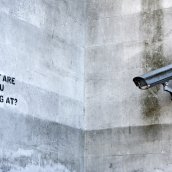
News & opinion
Threats with a smile: The cease-and-desist letter in a time of social media
Cease-and-desist letters aren't usually associated with a humorous tone, but levity can sometimes be more effective than dry threats.
Keep up to date by subscribing to our newsletter Perspectives.

Cease-and-desist letters aren't usually associated with a humorous tone, but levity can sometimes be more effective than dry threats.

Following news that Mozambique has acceded to the Banjul Protocol, part of the ARIPO system, Frouke Hekker sets out the two regional IP systems on the African continent, and their respective pros and cons for IP owners.

Banksy has failed to block a greetings card company from using one of his famous artworks, after the EUIPO agreed that the secretive street artist had no interest in commercially exploiting the trademark he had registered to protect it.

What happens to trademark rights when trade sanctions or other restrictive measures are placed on countries by the United Nations Security Council, or by countries or territories, such as the US or EU? Frederik Jocqué outlines the implications.

Although trademark owners are legally entitled to oppose applications for similar or identical marks, by enforcing these rights they can sometimes be perceived to be bullying other companies. It is key for brands, especially those that are well known, to exercise their rights in a way that avoids causing damage to their reputation.

Negotiations between the EU and Mexico on an updated Free Trade Agreement could potentially open the door to non-agricultural geographical indications (GIs). Time will tell if the EU is ready to embrace protection for handicrafts however.

It takes time, resources and money to create and launch distinctive and effective brands. But how can you be sure that the brand name you have chosen is really yours to use?

Trademark registrations provide an exclusive right to use protected brand names in the markets, and for the goods and services for which they have been registered. To maintain those rights, however, it is imperative to keep trademarks in use.

A Canadian brewery and a New Zealand leather shop have both been caught out this month after using a Māori word as a brand name that has quite a different meaning to the one they had originally intended.

The Tokyo 2020 Olympic and Paralympic Games may have been postponed, but that hasn't stopped counterfeiters from trying to get in on the act, with fake medals recovered by the Tokyo Metropolitan Police earlier this month.

From registering “non-traditional” trademarks to proving “genuine use” of a mark, Chantal Koller shares strategies for protecting and enforcing brand assets across Europe.

Support for diversity and inclusion or simply opportunistic 'rainbow-washing'? What does corporate use of the iconic PRIDE rainbow mean for the credibility of an iconic symbol?